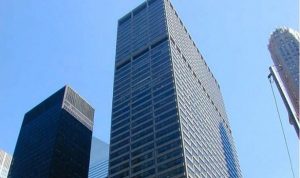 Blackstone's headquarters in Midtown Manhattan
Blackstone's headquarters in Midtown Manhattan
NEW YORK—Blackstone Group posted a loss in its first-quarter results amid the market selloff that has been fueled by the coronavirus. Corporate private equity, energy accounted for about half of the negative return.
The private equity giant's real estate holdings, however, held up relatively well. Its logistics operations, which comprises about one-third of the company's real estate portfolio, had $160.9 billion in assets under management, down 1.4% from $163.2 billion in the prior quarter but up 14.7% from $140.3 billion a year ago. Four of the firm's 5 largest investments include two logistics deals: Logicor and GLP and two high-growth office platforms, BioMed and its Indian office platform. "Investments in the hotel and retail sectors were the most directly impacted by COVID, and we saw a meaningful markdowns in these areas," CFO Michael S. Chae said during the earnings call. " However, they only comprise approximately 15% of the global real estate portfolio."
In addition, opportunistic real estate declined 8.8% and the hedge fund solutions group was down 8.6%.
CRE Should Emerge Bruised But Intact
But its core real estate funds depreciated by only 3.9% and continued to see inflows over the quarter, president Jonathan Gray said during the earnings call.
Overall, it has grown to nearly $50 billion, up 36% year-on-year, Gray said. "Given the market turbulence, we expect fundraising to continue, but now at a slower pace. Longer term, in a world of lower rates, we believe the secular shift to alternatives and Blackstone, in particular, will continue. Investor desire for better returns should be stronger than ever."
Gray also believes commercial real estate will emerged bruised but relatively intact from the coronavirus shutdown.
The industry will see a large decrease in new supply, he said, which helps. In the last recession, he also noted, the more traditional asset classes, apartments, warehouses in the last downturn, saw high single digit, mid-to high single-digit declines in sort of same-store cash flows. This recession is much deeper and it is likely the industry will see heavier declines.
But he went on to observe that first, it is too soon to say, and second, e-commerce creates a different dynamic in industrial.
In the office markets, income tends to be steady because of the length of the contract, although the market will weaken as companies pull back, Gray also said. One question that has emerged is whether people will want to work more remotely after it is safe to return to work.
"There will also be questions going the other way about will firms have the same density? Or will they spread out a little bit?" Gray said. Companies have made do with their employees working at home, but "we're much more efficient when we're together. So I guess I would start to think about this once we get through this very challenging part where so many people are on the sidelines when we move more into a, let's call it, a more traditional recession [when]…. you will see some impact certainly in terms of occupancy levels and rents, but you will also see the benefit of no new construction." He also said that very low interest rates will likely put downward pressure on cap rates for stable assets.
"So yes, there is going to be some headwinds in some of these sectors, and that will play through, and it takes a bit of time for that to happen."
A Bullish Mindset
Overall, Blackstone Group reported that its Q1 net loss was $1.07 billion or $1.58 per share, compared to net income of $481.30 million or $0.71 per share in the prior year.
Total revenues were negative $3.08 billion, compared to $2.02 billion in the prior year.
Despite its losses, the company remains undaunted. Gray reported that the company is already seeing opportunities appear from the dislocation initially in structured credit and liquid markets and that since the crisis began it has bought $11 billion of public equities and liquid debt "and we are well positioned to do more."
Blackstone also plans to invest in areas that have been most impacted by the coronavirus, including lodging, location-based entertainment and the travel industry.
Also working in its favor is its ability to hold assets until pricing and asset values normalize, CEO Stephen Schwarzman said during the earnings call. He pointed to its experience with Hilton Worldwide, which it purchased in October 2007, ahead of the market crash.
"At the worst point in the financial crisis, our $6 billion equity investment was marked down to $0.31 on the dollar. But the firm's staying power allowed us to focus on executing our operating plan," he said. "When the world eventually recovered, Hilton generated 10x that marked down value with $14 billion of profit for our investors, which may be the largest in private equity history."
© Touchpoint Markets, All Rights Reserved. Request academic re-use from www.copyright.com. All other uses, submit a request to [email protected]. For more inforrmation visit Asset & Logo Licensing.







